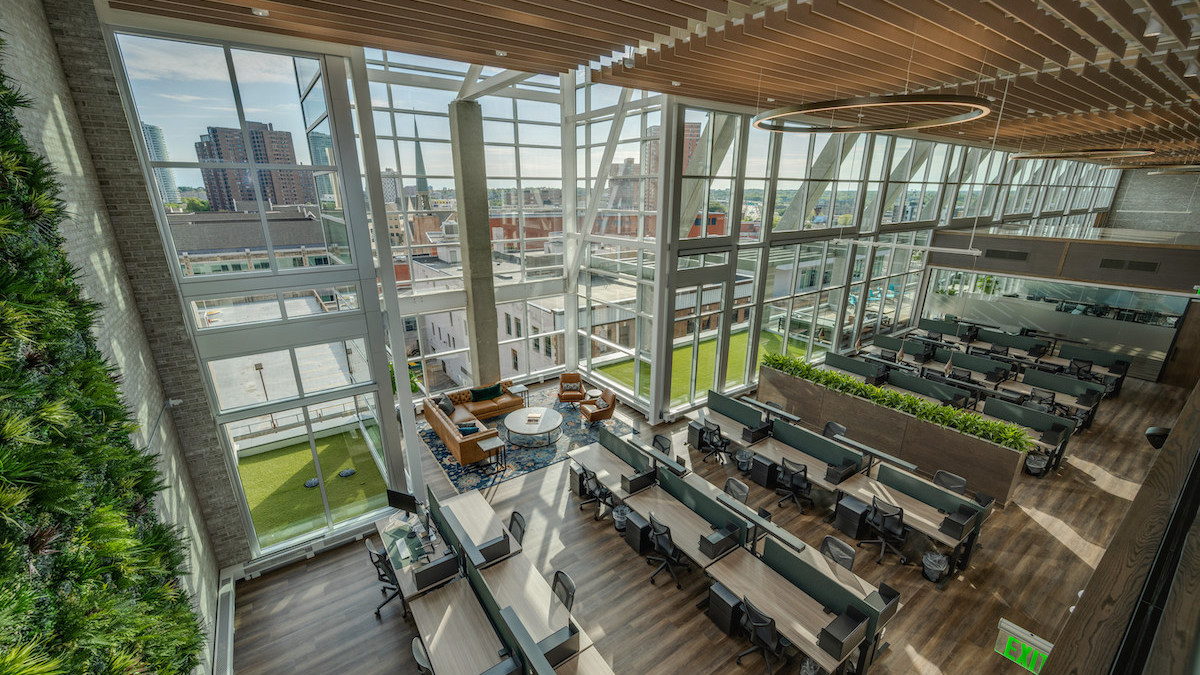JDS Development Group and Life Time Group Holdings, Inc, may be ushering in a new future for office spaces in the “post-COVID” world. The wellness chain Life Time has struck a deal with JDS Development to bring Life Time and Life Time Work coworking spaces to Downtown Brooklyn’s Brooklyn Tower.
The deal brings a few firsts: Life Time, which has over 150 athletic resorts across the United States and Canada, will lease and operate on over 100,000 square feet as it brings its first athletic club-plus-coworking space combination in New York City to Brooklyn’s first supertall tower. With the inclusion of a coworking space in its fitness facility, Life Time is staking their claim in the radically changing office sector.
“It’s an arms race for amenities,” James O’Reilly, president of Life Time, told The Real Deal. “The office and what a place to work means is undergoing a great rethink at the moment.”
The Brooklyn Tower facilities mark one of at least five centers Life Time will open by the end of next year, with eight currently in operation across the country. O’Reilly told the Real Deal that their coworking spaces are bringing in revenue “dramatically above pre-pandemic.”
The amenities are slated to include a fast-casual restaurant, indoor and outdoor social spaces, pools, a gym, and five studios for barre, cycling, pilates, yoga and group fitness. Workspaces will feature private and open floor plans and 15,000 square foot conference rooms.
Life Time Work also offers employers the opportunity to form a “corporate partnership” to subsidize gym costs for their entire workforce. Samsung, Duke University, and St. Jude Children’s Research Hospital are among the “corporate partners” that Life Time showcases on their website.
The terms of the deal have not been disclosed, though both the Life Time and Life Time Work facilities are scheduled to open in 2023.
Co-Working on the Mend
Initially, the pandemic decimated the coworking industry. Now, coworking mainstays like WeWork are rebounding.
At the height of the pandemic lockdowns in America, coworking firms were forced to close millions of square feet of unused space. NYC-based Knotel filed for bankruptcy in January 2021, and WeWork posted a loss of $3 billion for the first six months of 2021. The delta variant of COVID-19, followed by multiple waves of the omicron variant, made attracting workers back to work a halting process for employers.
Yet over the past two years, coworking firms refused to downsize – in fact, a September 2020 poll of about 80 companies by corporate consultancy CBRE showed that 86 percent of them still saw coworking spaces, or flexible space, as having “some kind of role” in their future real estate strategies.
The bet placed by WeWork and other coworking firms may pay off, as returning to the office remains unpopular among Americans with jobs that can be done remotely. A February 2022 study by the Phew Research Center found that the majority of American workers were still working at home, and 60 percent say they’d prefer to continue working from home all or most of the time.
However, the amenities and luxury trappings of Brooklyn Tower and Life Time Work could help NYC retain its remote workers – 17 percent of whom say they cannot go to the office because they have relocated. Working parents may find the available apartments attractive for themselves and their families – 32 percent said that lack of child care kept them working from home.
Additionally, the short-term leasing of coworking space could attract growing startups and small businesses looking for flexibility. “We can always upgrade and alter our space whenever we need it,” as one Atlanta WeWork client put it.
“For corporate occupiers considering spacing needs, having flexibility is exactly what they would want because of things like this pandemic,” Paul Leonard, a managing consultant at CoStar Advisory Services, told Recode.
“Our Best Building Yet”
In a statement, Atlantic Retail agent Joe Mastromonaco, who represented Life Time during lease negotiations, said, “Life Time was focused on finding the right fit for its Athletic Resort within the thriving Downtown Brooklyn market. The building JDS is developing at The Brooklyn Tower proved to be the perfect match. We think this location plays well with its upcoming location in Dumbo which is set to open this fall.”
Michael Stern, CEO of JDS, has said that the supertall “may be our best building yet.”
The Brooklyn Tower itself will include 550 apartments, with 150 condos ranging from $875,000 for studios to $8 million for four-bedroom units. Out of the 400 available rental units, for which leasing will begin this summer, 120 units will be designated as affordable. Douglas Elliman Development Marketing is overseeing sales for the 1,066-foot, 93-story supertall Brooklyn Tower at 9 DeKalb Avenue. According to data provider Marketproof, the total sellout on the condo units is over $380 million.
About the Author

Ryan Nelson
I’m an investor, real estate developer, and property manager with hands-on experience in all types of real estate from single family homes up to hundreds of thousands of square feet of commercial real estate. RentalRealEstate is my mission to create the ultimate real estate investor platform for expert resources, reviews and tools. Learn more about my story.
